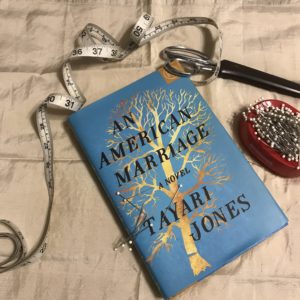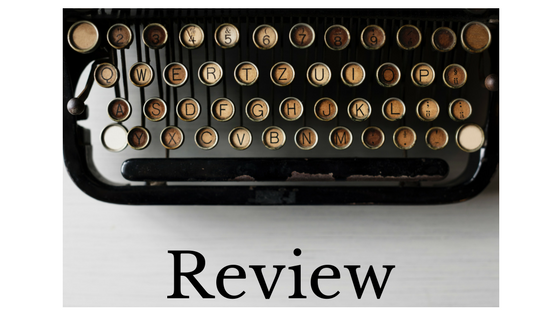 All around Roy were shards of a broken life, not merely a broken heart. Yet who could deny that I was the only one who could mend him, if he could be healed at all? Women’s work is never easy, never clean.
All around Roy were shards of a broken life, not merely a broken heart. Yet who could deny that I was the only one who could mend him, if he could be healed at all? Women’s work is never easy, never clean.
Synopsis
On the night Roy and Celestial decide to try for a baby, Roy is arrested and wrongly accused of a crime he didn’t commit. Roy and Celestial find themselves looking at a twelve-year sentence only eighteen months into their marriage. As Roy lives behind bars, life—and his marriage—moves on without him. When Roy finds himself suddenly released early, he sets off home to find out what, if anything, remains of his and Celestial’s marriage.
Characters
Jones did an excellent job introducing Roy and fleshing out his character. Of the three viewpoints in An American Marriage (Roy, Celestial, and their friend Andre), he was the only character I felt I really knew. Even the viewpoints of the other characters seemed mostly to serve to introduce Roy to the reader. When Andre visits Roy’s father to pick Roy up from prison, I didn’t learn anything in particular about Andre; rather, I saw Roy through his father’s eyes. Saw the sacrifices that allowed Roy Jr. to leave his small town, to try to become the man he wanted to be. I met Roy through the dialect of the people where he grew up in Louisiana, through Celestial and her family that adopts him in Atlanta.
I don’t feel the same about Celestial, though my sense that I don’t now her comes as a contrast to Roy since I felt he was so deeply introduced. Her chapters seemed to try to give an introduction to who Celestial was, particularly when interacting with her father and Roy’s and Andre’s chapters gave an outside view of her…but I was left feeling like I didn’t know Celestial nearly as well as I knew Roy, and I wanted to. The book doesn’t read as if it is about one main character, but rather that the Marriage and its participants are the focus. And yet, I was left hanging with Celestial—unconnected to her as a character, not engaged with her and the choices she was making. In some ways, it seemed Celestial didn’t truly know herself and her actions reflected this. However, if the point was that Celestial didn’t’ know herself, this made it awfully difficult to introduce her to a reader and to make a reader care for her. It was ultimately a lopsided marriage and while the writing may have been making this point, it didn’t feel like a deliberate choice not to round out Celestial. In some ways, I even felt like I knew Andre better than I knew Celestial and he was the most peripheral of the three characters.
Themes
Two related themes in An American Marriage struck me in particular and made this book both a good and a hard read. The first, admittedly obvious point, is that being an African American (particularly an African American man) in this country (particularly but not exclusively in the South) has inherent danger. No matter how far you have climbed, how upright and moral you are, the color of you skin alone places you in suspicion. When circumstances are right (or wrong), the color of your skin alone can land you in prison for a crime you didn’t commit. It’s easy to think that Roy’s story in An American Marriage is just a story, based around a plotline that is far-fetched. And yet, the wrongful convictions of four African-American and one Hispanic youth in the Central Park Jogger case and the wrongful conviction of African-American football player Brian Banks belie the idea that wrongful convictions of people of color still happen.
The second was a question about how far from your roots you can ever really grow. On the one hand, Celestial’s father was a chemistry teacher who discovered a synthetic substance that made the family millions when the patent was sold. He’s a black man who was able to raise himself up from what seemed to be lower-middle to middle-middle class in Atlanta to richy-rich, though he still chose to live on the black side of town. His choice to remain on the black side of town, having bought a mansion from a white family who was too nervous to continue to live there (it being a black neighborhood), raises questions about how far success can take a black family. They could have lived anywhere. But would they have been safe? You can see the Davenport choice to stay in the neighborhood as staying where they are comfortable. You can also see it as an example of staying safe—choosing to limit their success so that the family is successful in ways that stay palatable (re: largely unseen) to white Atlanta. Similarly, when Celestial gains a following making dolls as art, she’s Ebony famous. Her store is in an area where it is accessible to Black Atlantians with money but not in the Black part of town where whites would feel uncomfortable shopping.
Where the Davenports have had their success constrained by white senses of propriety, Roy’s life has the greatest constraints. Roy grew up poor in Louisiana. He went to Morehouse, got a job with upward mobility, and scrapped and hustled. He was on the come-up. Until he was Black at the wrong place in the wrong time and his Morehouse degree and cufflinks didn’t matter one whit to a mostly white jury in Louisiana.
The idea of this—that skin color alone can make you vulnerable, can cost you years of your life and health—is so abhorrent that we would rather pretend it isn’t possible than deal with the idea that this happens to people. And, as Roy’s and Celestial’s marriage shows, even if you’ve been freed, even if you’ve been set “right,” there is no getting back what that wrongful conviction took. Roy and Celestial can’t get those five years back—there were life events Roy missed in prison that he doesn’t get the chance to re-experience. The marriage suffers, with Roy in prison three times longer than they were married to start with. One of the wrongful convictions I mentioned earlier was of football player Brian Banks—before his false accusation, he was a rising football star. By the time he made it out of prison several years later and was exonerated, it was over five years later. He was signed to an NFL team but never made it off the practice squad.
While the reader is left with the question of what Roy might have been, there are real Roys—there are Brians, there are the Central Park Five—walking around, unable to get those five, six, ten years inside back.
And indeed, the life inside changes Roy, as it must inevitably change anyone who spends any amount of time there. My job affords me access to see prisoners in jail in their pods, so I have seen jail life closer up than most people have outside of watching Orange is the New Black. It is not any place I would want to spend any amount of time. And yet, I’m not going to pretend that I have any idea what five years in actual prison must be like. Roy leaves with physical scars (as does Celestial, a remnant of police treatment during Roy’s arrest) as well as psychological ones—the result of becoming responsible for something inside that he didn’t understand until it was too late.
In this way, the damage done to Roy and Celestial’s marriage feels almost inevitable. Marriage changes you, but in theory its changing both of you in ways that mean you can grow and change together. Roy’s incarceration changes Roy and Celestial in ways that seem impossible to mend.
Writing
An American Marriage is, overall, strongly written with alternating first-person viewpoints from the three characters, along with sections of letters between characters. Because the characters are mostly speaking to each other or to other African Americans, there is no need to code-switch in their speech so Jones doesn’t have them speaking white. At the same time, the language is clear enough for a white audience to read without feeling terribly out of the loop. It’s a fine line but (as far I can tell as a white woman) it’s a line Jones walks well to stay realistic for her Black audience but not alienating of a non-Black audience.
Recommended
I picked An American Marriage for my BOTM pick for February a few days before Oprah announced it as her Book Club selection. I can see why she chose it—it is a powerful book that can have mass appeal. With that, I know people for whom that Oprah sticker would be a turn-off. Even for those highbrow folks, An American Marriage is worth a read. The writing is strong, even poignant at times, with relevant and important themes, and a character that stays with you even after you close the book. I finished several days ago and I still find myself hoping Roy—with all of his flaws and sometimes cocksure personality—found happiness after the book ended.
Notes
Published: February 6, 2018 by Algonquin Books (@algonquinbooks)
Author: Tayari Jones (@tayari)
Date read: February 25, 2018
Rating: 4 stars

